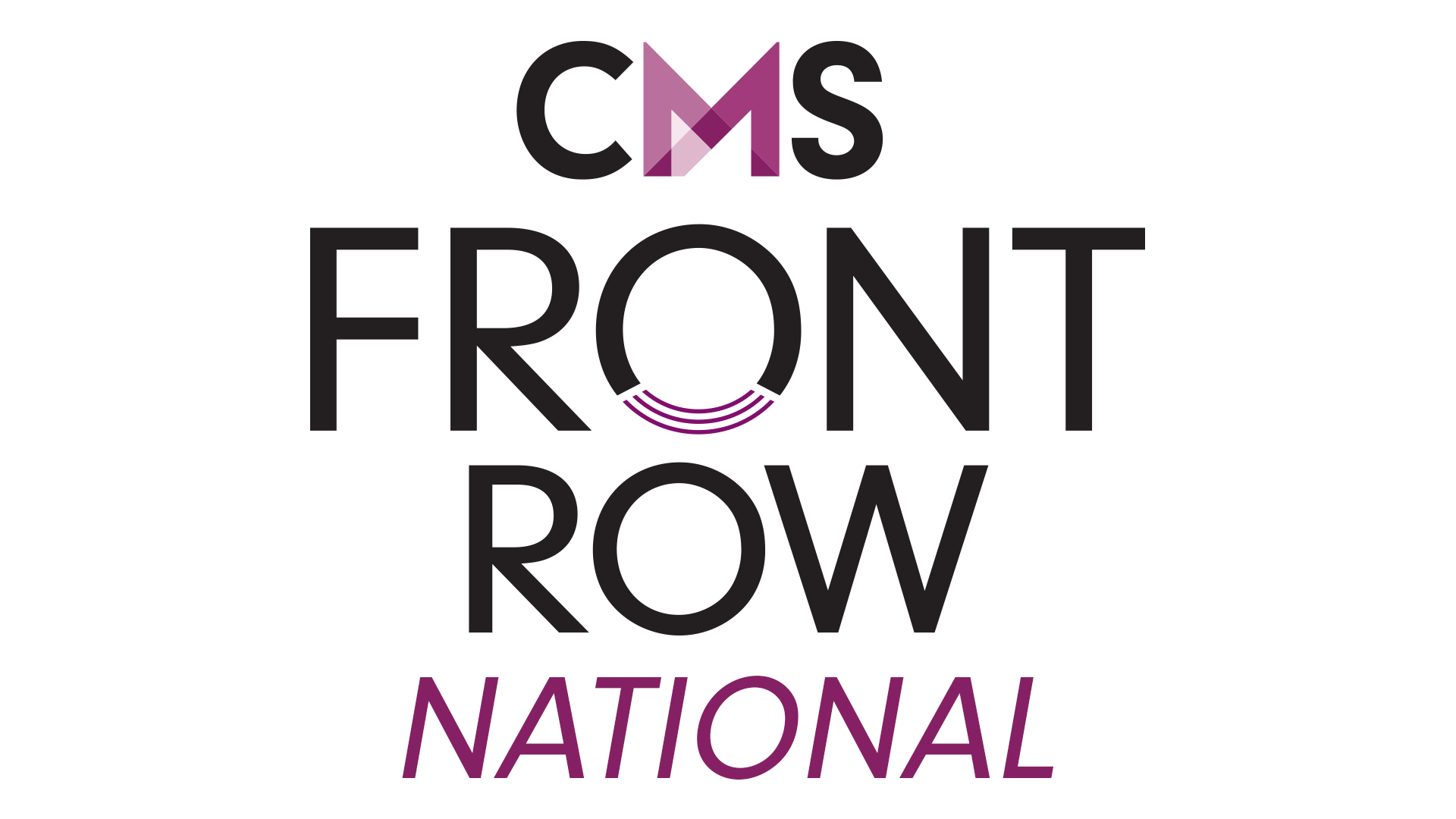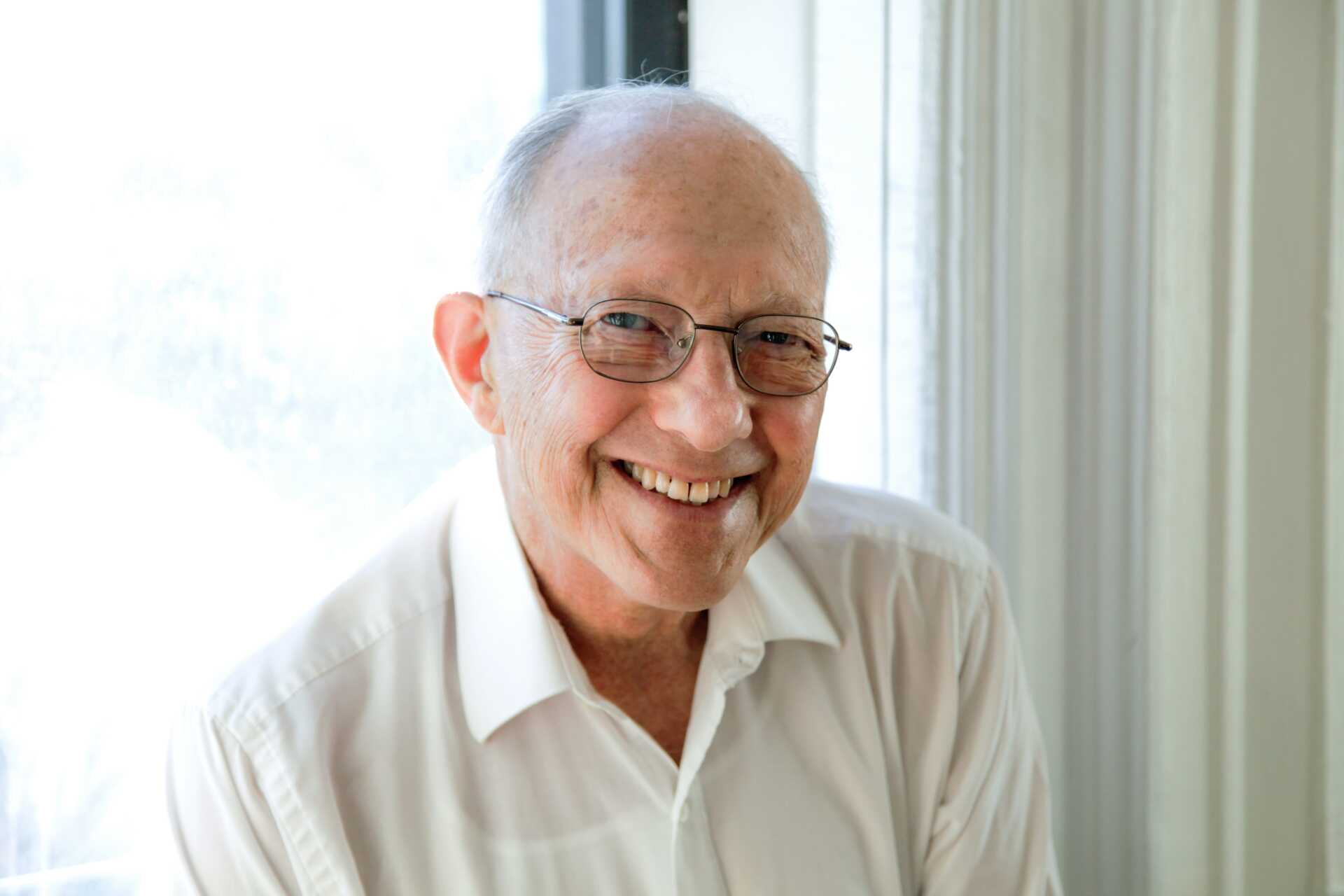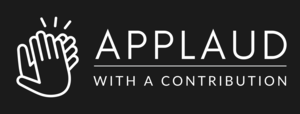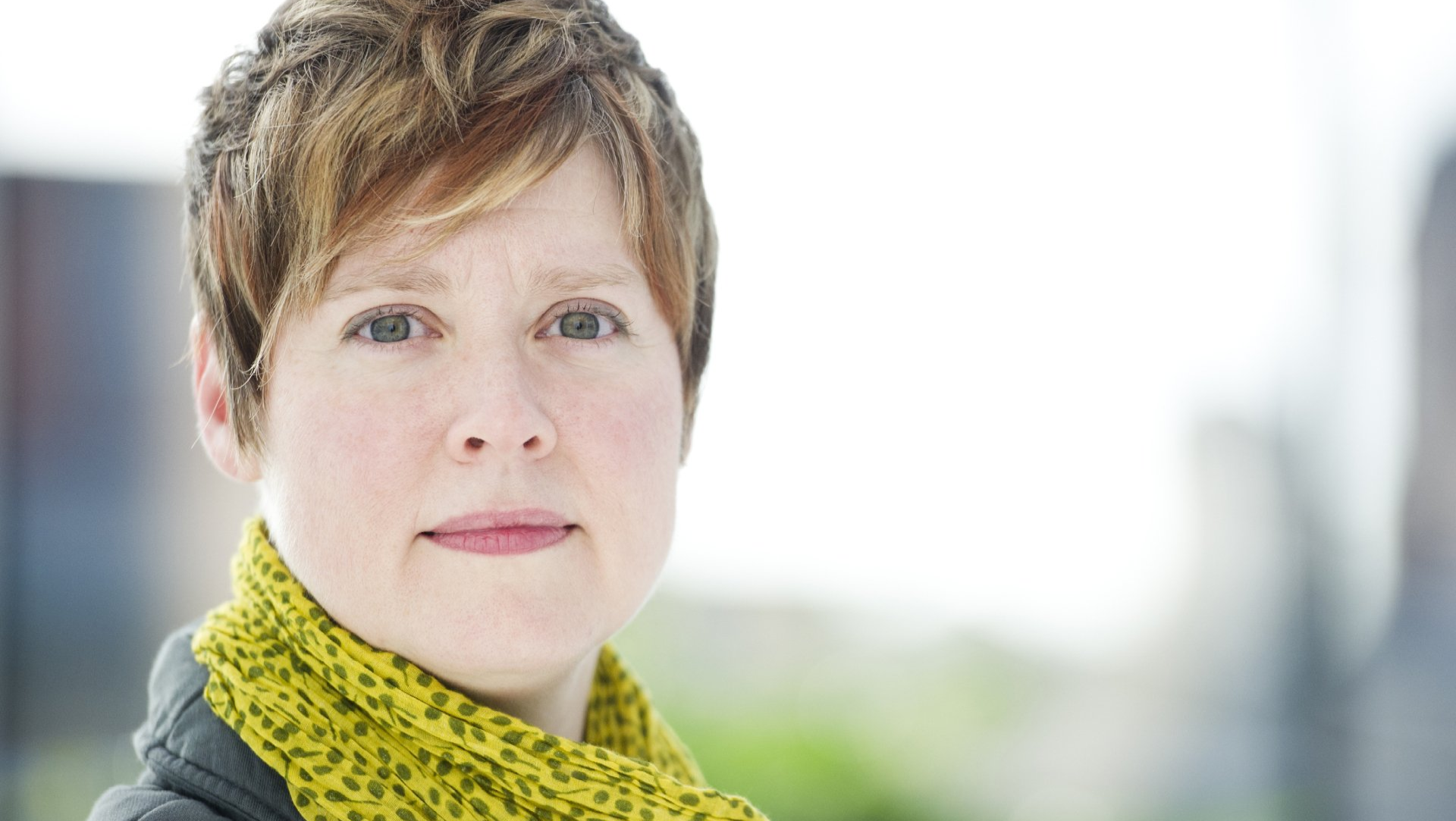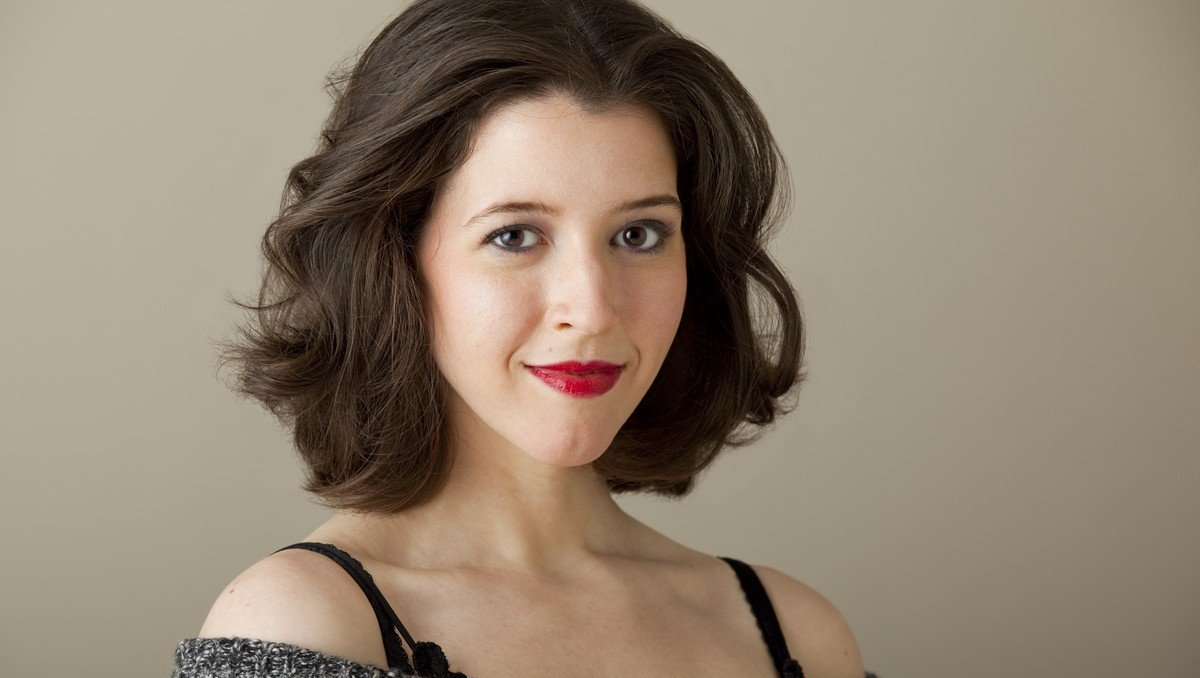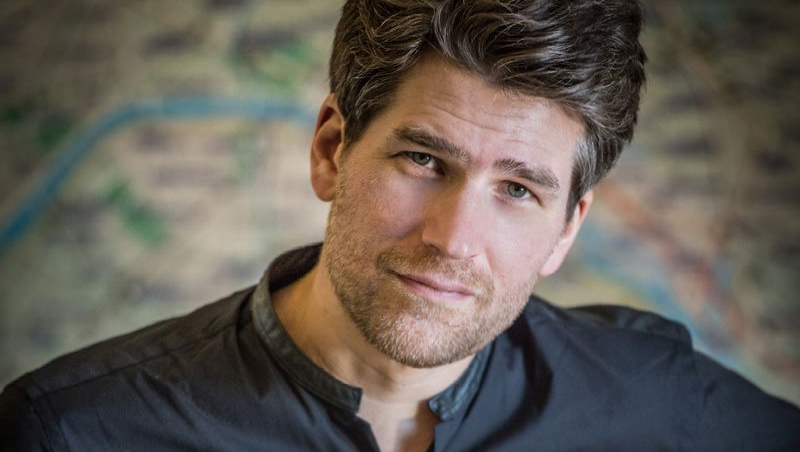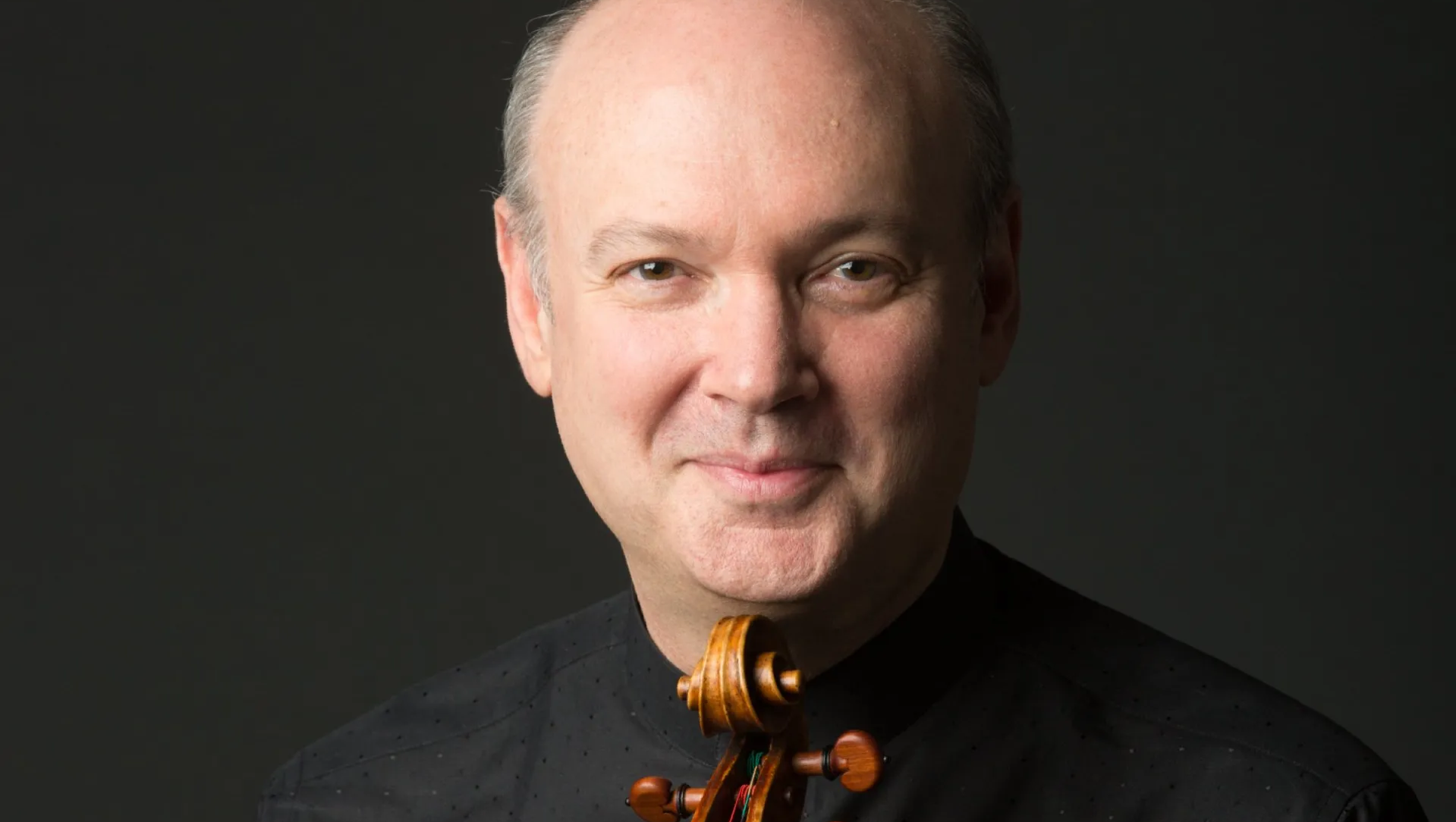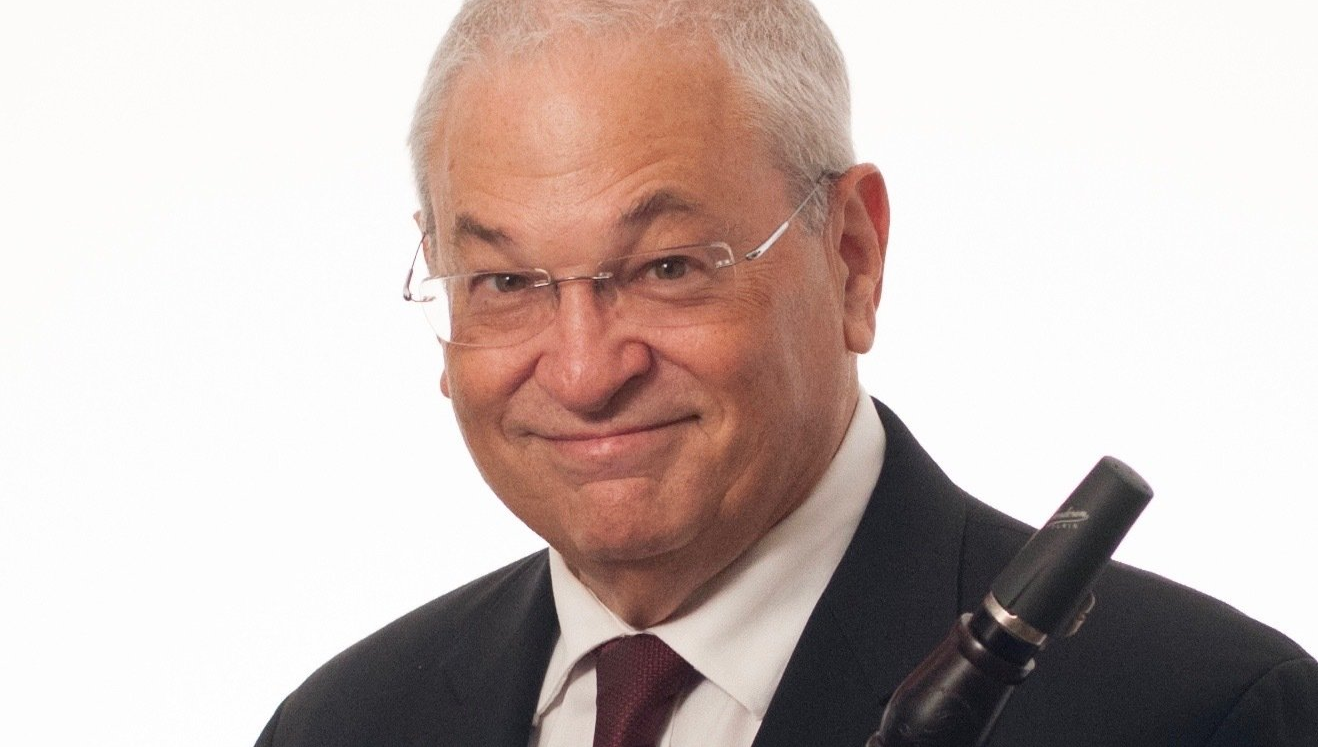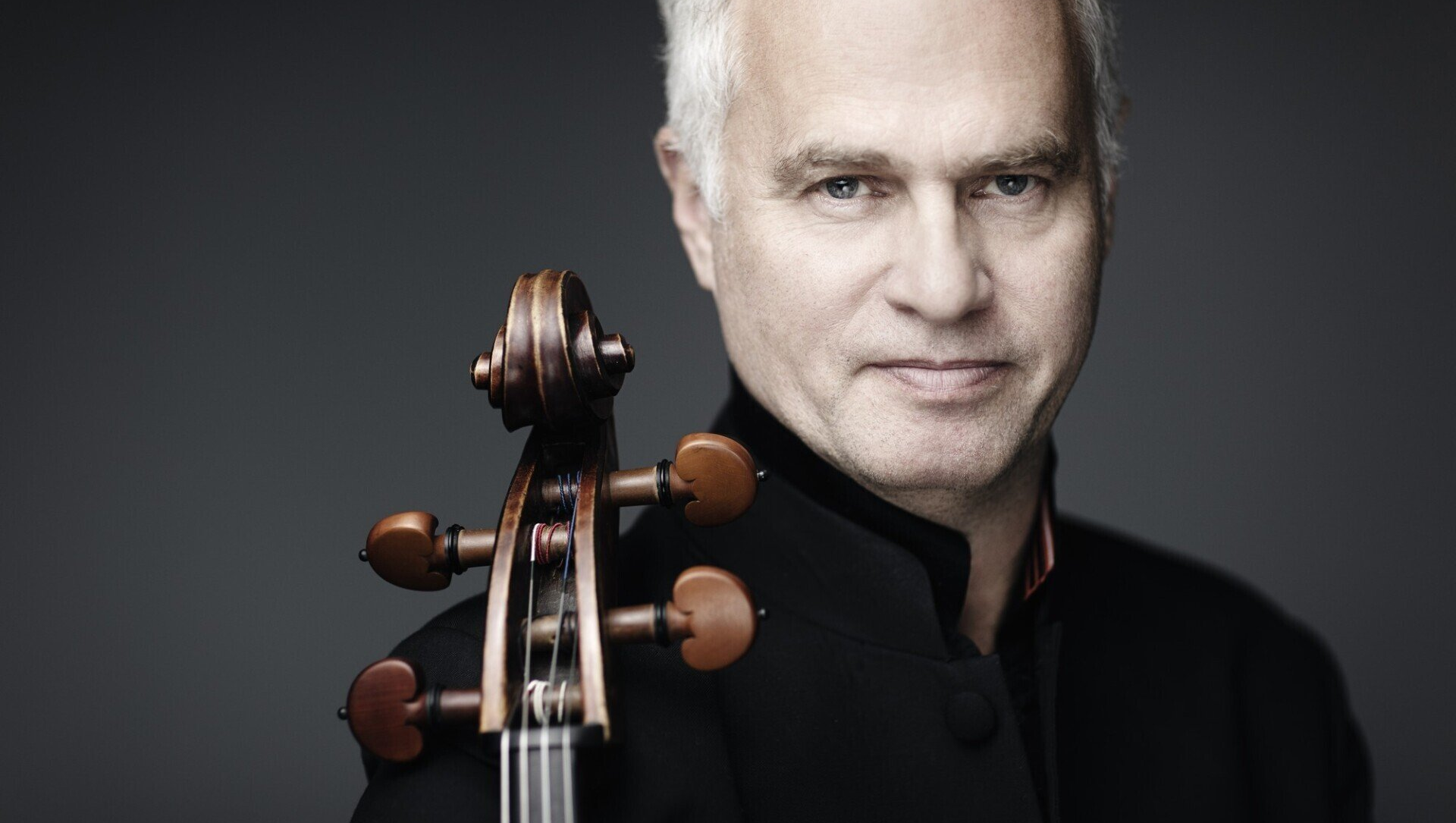> Click the
"PLAY" button below anytime after 7:30 PM on Thursday, January 21. This presentation will remain available for viewing until midnight on Monday, January 25.
NOVEMBER 19, 2020
7:30 PM
Celebrating the Artistry of
GILBERT KALISH
Program Notes
and
Artists Bios
PROLOGUE
• Introduction: David Finkel and Wu Han
• Grand Pause: Gil Kalish talks about his extraordinary musical life, his appetite for life, and how the pandemic has kept him busier then ever.
GEORGE CRUMB (b. 1929)
Three Early Songs
(1951)
- Night
- Let It Be Forgotten
- Wind Elegy
Tony Arnold, soprano • Gilbert Kalish, piano
FRANZ SCHUBERT
(1797-1828)
The Shepherd on the Rock, D. 965
(1828)
Lisette Oropesa, soprano • David Shifrin, clarinet • Gilbert Kalish, piano
JOHANNES BRAHMS (1833-1897)
Piano Quartet No. 3 in C minor, Op. 60 (1824)
- Allegro non troppo
- Scherzo: Allegro
- Andante
- Finale: Allegro comodo
Gilbert Kalish, piano • Nicolas Dautricourt, violin • Paul Neubauer, viola • Torleif Thedéen, cello
EPILOGUE
CMS artistic directors David Finkel and Wu Han speak with Gilbert Kalish about his long and fascinating career.
Concert Duration: 1:23 minutes
This FREE Virtual Concert is made possible thanks to the generosity of
Ronald and Heather Florence.
The presentation begins at 7:30 PM on Thursday, November 19. You may enjoy it your convenience until Midnight on Monday, November 23.
- FRONT ROW VIEWING TIPS
A few helpful tips to enjoy the show:
1. You can stream the concert from any device with a strong internet connection. Sound quality will vary depending on the speakers and device you are using. If you are using your compuer we recommend wearing headphones.
2. The video will not automatically start to play. Please click the “play” icon located in the lower left corner of the video.
3. What if I am late to the premiere of the streaming concert?
No worries, you have 5 full days to enjoy each concert.
3. Can I watch the concert in full screen mode?
Yes! That option is located in the lower right corner of the video frame. To exit full screen mode at any time, just press the "Esc" button to return to the main viewing page.
4. Can I control the video resolution?
Yes! There is a video resolution control located in the lower right corner of the video frame of the streaming concert. It usually defaults to "auto" to adjust to your bandwidth automatically, but if you choose to control this more manually, that option is available.
4. Can’t hear anything?
Don’t forget to unmute/turn up the volume on your device.
5. To stream the video to your home TV:
If you are an Apple user, you can use AirPlay or screen mirroring to display the video from your iPhone, iPad, or iMac to your Apple TV (or other smart TV with AirPlay capability). You can also achieve this using an HDMI cable to send the signal from your laptop to your TV.
6. Need a break?
You can pause the performance anytime. If you close out of the browser window, you will lose your place in the video, so make sure to note the time you are pausing if you are not returning right away and want to resume from where you left off.
THANK YOU FOR YOUR GENEROSITY
RICMC needs your support during this difficult time for the performing arts and performing artists. Please consider supporting this important series with a charitable one-time or monthly donation of any amount.
Notes on the Program
Three Early Songs
for voice and piano
(1947)
by George Crumb
(b. Charleston, WV, 1929)
Crumb wrote these songs in 1947, the year he graduated high school and entered Mason College in his native Charleston, West Virginia. His now-wife of 70 years, Elizabeth May Brown, was the first to sing them and they are dedicated to her. They are wholly unlike the works that Crumb eventually became famous for—their sound is more early 20th century art song than the unique and otherworldly sound palette he would later develop. Crumb explained that in West Virginia at that time, Debussy was “almost an ultra-modern.” These songs, with delightful melodies and floating harmonies, show that young Crumb, even before finding his mature style, still had a gift for music that is understated yet emotionally powerful.
Crumb suppressed the vast majority of his student compositions but he’s allowed performance of these songs. “Most of the music I wrote before the early sixties (when I finally found my own voice) now causes me intense discomfort,” he writes, “although I make an exception for a few songs which I composed when I was 17 or 18.… these little pieces stayed in my memory and when, some years ago, Jan DeGaetani expressed an interest in seeing them (with a view to possible performance if she liked them), I made a few slight revisions and even decided to have them published. Jan and Gil Kalish eventually did perform them on several occasions.”
Night
How beautiful is night!
A dewy freshness fills the silent air;
No mist obscures, nor cloud, nor speck, nor stain
Breaks the serene of heaven:
In full-orb’d glory, yonder Moon divine
Rolls through the dark-blue depths.
Beneath her steady ray
The desert-circle spreads,
Like the round ocean, girdled with the sky.
How beautiful is night!
Let it be Forgotten
Let it be forgotten, as a flower is forgotten,
Forgotten as a fire that once was burning gold,
Let it be forgotten forever and ever,
Time is a kind friend, he will make us old.
If anyone asks, say it was forgotten
Long and long ago.
As a flower, as a fire, as a hushed footfall
In a long forgotten snow.
Wind Elegy
Only the wind knows he is gone,
Only the wind grieves,
The sun shines, the fields are sown,
Sparrows mate in the eaves;
But I heard the wind in the pines he planted
And the hemlocks overhead,
“His acres wake, for the year turns,
But he is asleep,” it said.
From Gilbert Kalish:
I first encountered George Crumb way back in the 60s when I played four short works of his for violin and piano. His writing astonished me. I had never heard anything like it nor previously been asked to use the insides of the piano. It was a sound world of the utmost beauty and mystery. Since then I have been truly blessed to perform many of George's compositions, each one a new world of sound. And I have been even more fortunate that I was given the opportunity of performing the premiere performances of four or five of his magnificent creations including Celestial Mechanics for Piano, Four Hands (and page turner). I consider him to be one of the greatest and most original composers of our time.
Charles Wadsworth commissioned Celestial Mechanics for CMS. He asked the great Paul Jacobs to perform it. Paul was one of the great pianists of our time but never achieved the fame that he deserved. He was an American pianist who went to Paris and worked closely with Boulez. When he returned to America he was the pianist of the New York Philharmonic and brilliantly recorded all the works of Debussy and Schonberg as well as works of Elliott Carter, Bartók, Stravinsky, Busoni, and many others. He was also a truly spectacular harpsichordist. He was one of the first people to be felled by AIDS, and he succumbed to that almost unknown illness in the early 80s. I was honored when Charles asked me to join Paul for the premiere of Celestial Mechanics in 1979. The page turner was Richard Goode.
“The Shepherd on the Rock”
for Soprano, Clarinet, and Piano, D. 965 (1828)
by Franz Schubert (Vienna, 1797 – Vienna, 1828)
The Shepherd on the Rock was one of Schubert’s last works. He was an enigma to the end, writing some of his most cheerful music at the darkest times in his life. He was suffering from a chronic illness (probably syphilis) and he moved to his brother’s house in a Viennese suburb, where the fresh air was supposed to help ease his symptoms.
This song was composed at the request of Schubert’s friend and renowned soprano Anna Milder-Hauptmann, who asked for a piece that allowed her to show a wide range of emotions. Schubert created a 12-minute cantata-like composition for her with an innocent, playful first section, dark middle section, and exuberantly happy ending. To do it he excerpted and combined the poetry of two different writers: Wilhelm Müller and Karl August Varnhagen von Ense. And he also added a wind part, something that may have been in fashion at the time because his only other song with a wind part, “Auf dem Strom,” was composed in the same year. Schubert passed away without delivering the score to Milder-Hauptmann and it took many months for his brother to organize his papers, so the work wasn’t premiered until February 10, 1830.
Wenn auf dem höchsten Fels ich steh,
Ins tiefe Tal hernieder seh
Und singe.
When I stand on the highest rock,
I look down to the valley
And sing.
Fern aus dem tiefen dunkeln Tal
Schwingt sich empor der Widerhall
Der Widerhall der Klüfte.
Far away, from the deep, dark valley,
The echo rises up
The echo from the ravines.
Je weiter meine Stimme dringt,
Je heller sie mir wiederklingt
Von unten.
The farther my voice resounds,
The brighter it echoes back to me
From below.
Mein Liebchen wohnt so weit von mir,
Drum sehn ich mich so heiss nach ihr
Hinüber.
My sweetheart lives so far from me,
I long for her so ardently,
Far away.
Je weiter meine Stimme dringt,
Je heller sie mir wiederklingt
Von unten.
The farther my voice resounds,
The brighter it echoes back to me
From below.
Wenn auf dem höchsten Fels ich steh,
Ins tiefe Tal hernieder seh
Und singe.
When I stand on the highest rock,
I look down to the valley
And sing.
Fern aus dem tiefen dunkeln Tal
Schwingt sich empor der Widerhall
Der Widerhall der Klüfte.
Far away, from the deep, dark valley,
The echo rises up
The echo from the ravines.
In tiefem Gram verzehr ich mich,
Mir ist die Freude hin,
Auf Erden mir die Hoffnung wich,
Ich hier so einsam bin.
I am consumed by grief,
My joy is gone
I have no more hope on earth,
I am so lonely here.
So sehnend klang im Wald das Lied,
So sehnend klang es durch die Nacht,
Die Herzen es zum Himmel zieht
Mit wunderbarer Macht.
My song rang longingly in the woods,
Rang longingly through the night.
It draws hearts toward heaven
With wondrous power.
Der Frühling will kommen,
Der Frühling, meine Freud’,
Nun mach ich mich fertig
Zum Wandern bereit.
Springtime will come,
Springtime, my joy.
I will now prepare
For a long journey.
Je weiter meine Stimme dringt,
Je heller sie mir wiederklingt.
The farther my voice resounds,
The brighter it resonates back to me.
Der Frühling will kommen,
Der Frühling, meine Freud’,
Nun mach ich mich fertig
Zum Wandern bereit.
Springtime will come,
Springtime, my joy.
I will now prepare
For a long journey.
Je weiter meine Stimme dringt,
Je heller sie mir wiederklingt.
The farther my voice resounds,
The brighter it resonates back to me.
From Gilbert Kalish:
In the early 1950s I studied at Tanglewood. Not having gone to a music conservatory, my contact with other young musicians occurred primarily at summer festivals such as Tanglewood. In 1957 a group of young musicians formed a large chamber ensemble called the Gramercy Chamber ensemble and invited me to be their pianist. The group included four singers and one of those singers was Jan DeGaetani. While rehearsing Arnold Schonberg's Pierrot Lunaire, we became very close musical colleagues and she and I started a partnership that lasted more than 30 years until her untimely death in 1989.
It was through our work together that I developed a great love for the song repertoire. We worked not as coach and soloist but as real partners. Working together in that way was one of the greatest musical and personal gifts in my life. In these last few years I have developed an extremely satisfying partnership with Randall Scarlata and Dawn Upshaw. And over these many years, I have been privileged to perform with many incredible singers such as Jon Vickers, Benita Valente, and many other wonderful artists, including quite a few at the Chamber Music Society. I consider myself simply a pianist who has the privilege of being involved in an immense variety of genres and repertoire with vocal music just being one part of that.
Piano Quartet No. 3 in C minor, Op. 60 (1855-56, 1874)
by Johannes Brahms (Hamburg, 1833 – Vienna, 1897)
Brahms wrote the original version of this piano quartet while helping Clara Schumann through the most difficult period of her life—the two-and-a-half years between her husband’s suicide attempt and his death. Brahms acted as Schumann’s assistant and confidant while her husband was institutionalized. Though Brahms was only 21 years old and 14 years younger than Schumann, he fell madly in love with her. She had strong feelings for him too, though she was less infatuated and more realistic about marrying again. After Robert’s death, when they could have chosen to be together, they made the decision to part ways but remained close friends for the next 40 years.
Brahms wrote this piano quartet and then put it aside, revising it in the late 1860s and again in 1874. He was meticulous about destroying his sketches and unpublished pieces so it’s difficult to know exactly what the original version sounded like. But it was certainly very different: in a different key and with three movements rather than four. Brahms must have also seen a lot of his younger self in the piece. He jokingly wrote to the publisher that it should be accompanied by a picture of himself dressed as Goethe’s character Werther, a passionate young man who kills himself because of his love for a married woman.
Despite the revisions, the final version is replete with the tension and ardor of the younger Brahms. Musicologist Eric Sams has speculated that the opening theme in the strings is a ‘Clara’ theme because it’s similar to a cipher that Schumann used for his wife. Whether or not that’s true, the themes run an emotional gamut from slowly searching to loudly decisive to lyrically melodic. A quiet, exhausted ending leads to the lively scherzo. In an interesting parallel, the last two movements each begin with string solos. The slow movement is introspective and the finale brings back the wider range of emotions found in the first movement. The piece ends quietly with two definitive yet unexpected chords punctuating this look back at Brahms’s stormy youth.
Program Notes by Laura Keller, CMS Editorial Manager
About the Artists
GILBERT KALISH, pianist
The profound influence of pianist Gilbert Kalish as an educator and pianist in myriad performances and recordings has established him as a major figure in American music-making. In 2002 he received the Richard J. Bogomolny National Service Award for his significant and lasting contribution to the chamber music field and in 2006 he was awarded the Peabody Medal by the Peabody Conservatory for his outstanding contributions to music in America. He was the pianist of the Boston Symphony Chamber Players for 30 years, and was a founding member of the Contemporary Chamber Ensemble, a group that flourished during the 1960s and 70s in support of new music. He is particularly well-known for his partnership of many years with mezzo-soprano Jan DeGaetani, as well as for current collaborations with soprano Dawn Upshaw and cellists Timothy Eddy and Joel Krosnick. As an educator and performer he has appeared at the Banff Centre, the Steans Institute at Ravinia, the Marlboro Music Festival, and Music@Menlo, where he serves as the international program director of the Chamber Music Institute. He also served as chairman of the Tanglewood faculty from 1985 to 1997. His discography of some 100 recordings embraces both the classical and contemporary repertories; of special note are those made with Ms. DeGaetani and that of Ives's Concord Sonata. A distinguished professor at Stony Brook University, Mr. Kalish has performed regularly with the Chamber Music Society of Lincoln Center since 2004.
Tony Arnold, soprano
Tony Arnold is internationally acclaimed as a leading proponent of contemporary music in concert and recording: a “convincing, mesmerizing soprano” (Los Angeles Times) who “has a broader gift for conveying the poetry and nuance behind outwardly daunting contemporary scores” (Boston Globe). Her unique blend of vocal virtuosity and communicative warmth, combined with wide-ranging skills in education and leadership, was recognized with the 2015 Brandeis Creative Arts Award, given in appreciation of “excellence in the arts and the lives and works of distinguished, active American artists.” Her extensive chamber music repertory includes major works written for her by Georges Aperghis, Eric Chasalow, George Crumb, Nathan Davis, Brett Dean, Jason Eckardt, Gabriela Lena Frank, Fredrick Gifford, David Gompper, Jesse Jones, Josh Levine, David Liptak, Philippe Manoury, Carlos Sanchez-Gutierrez, Christopher Theofanidis, Ricardo Zohn-Muldoon, and John Zorn. She is a member of the intrepid International Contemporary Ensemble and enjoys regular guest appearances with leading ensembles and presenters worldwide. With more than 30 discs to her credit, she has recorded a broad segment of the modern vocal repertory with esteemed chamber music colleagues. She received a 2006 Grammy nomination for her recording of George Crumb’s Ancient Voices of Children (Bridge Records). She is a first-prize laureate of the Gaudeamus International and the Louise D. McMahon competitions. A graduate of Oberlin College and Northwestern University, Ms. Arnold was twice a fellow of the Aspen Music Festival as both a conductor and singer. She currently teaches at the Peabody Conservatory and the Tanglewood Music Center.
Lisette Oropesa, soprano
Soprano Lisette Oropesa has been hailed as one of the most exciting and magnetic singers of her generation. Last season, she returned to the Metropolitan Opera in two title roles, Manon and Violetta in La Traviata. She sings Ophélie in Hamlet with the Washington Concert Opera, and heads back to Paris to make her role debut as Rosina in Il Barbiere di Siviglia. In 2019, she was named the recipient of the Richard Tucker Award. She has appeared in over 100 performances at the Metropolitan Opera, and has appeared in eight of the Met's Live in HD productions. In concert she has performed with the Cleveland Orchestra, Chicago Symphony Orchestra, Philadelphia Orchestra, Pittsburgh Symphony Orchestra, and at the Ravinia, Cincinnati May, and Tanglewood festivals. She has also appeared in Carnegie Hall's Weill Hall and made her New York recital debut at the Park Avenue Armory. A first generation Cuban-American, Ms. Oropesa was raised in Baton Rouge, Louisiana and graduated from the LSU School of Music at Louisiana State University. She is an alumnus of the Metropolitan Opera's Lindemann Young Artists Program and her many awards include Grand Finals Winner of the 2005 Metropolitan Opera National Council Auditions, a 2007 Sarah Tucker Grant from the Richard Tucker Foundation, the Zarzuela Award at the 2007 Operalia International Opera Competition, and the 2008 George London Award.
Nicolas Dautricourt, violinist
Voted ADAMI Classical Discovery of the Year at Midem in Cannes and awarded the Sacem Georges Enesco Prize, Nicolas Dautricourt is one of the most brilliant and engaging French violinists of his generation. In the 2018-19 season he went on tour in Bucharest, Montreux, and Lille with the Orchestre Français des Jeunes under Fabien Gabel, performing Saint-Saëns’s Third Concerto and Bartók’s Second Concerto, and made his debut at the Paris Philharmonie with Prokofiev’s Second Concerto. He appears at major international venues, including the Kennedy Center, Wigmore Hall, Tchaikovsky Hall, Tokyo’s Bunka Kaikan, Salle Pleyel in Paris, and Théâtre des Champs-Élysées, and appears at many festivals such as Lockenhaus, Music@Menlo, Pärnu, Ravinia, Sintra, and Davos. He also has performed with the Detroit Symphony, Royal Philharmonic Orchestra, Orchestre National de France, Orchestre de Toulouse, Quebec Symphony, Liège Philharmonic, Sinfonia Varsovia, Mexico Philharmonic, NHK Tokyo Chamber Orchestra, and the Kanazawa Orchestral Ensemble, under conductors Leonard Slatkin, Paavo Järvi, Tugan Sokhiev, Dennis Russell Davies, Eivind Gullberg Jensen, Yuri Bashmet, Michael Francis, François-Xavier Roth, Fabien Gabel, and Kazuki Yamada. He appears in such jazz festivals as Jazz à Vienne, Jazz in Marciac, Sud-Tyroler Jazz Festival, Jazz San Javier, Copenhagen Jazz Festival, and the European Jazz Festival in Athens. Award winner of the Wieniawski, Lipizer, and Belgrade competitions, he has studied with Philip Hirschhorn, Miriam Fried, and Jean-Jacques Kantorow. An alum CMS’s Bowers Program, he plays a magnificent instrument by Antonio Stradivari, the "Château Fombrauge" (Cremona 1713), on loan from Bernard Magrez.
Paul Neubauer, violist
Violist Paul Neubauer has been called a “master musician” by the New York Times. He recently made his Chicago Symphony subscription debut with conductor Riccardo Muti and his Mariinsky Orchestra debut with conductor Valery Gergiev. He also gave the US premiere of the newly discovered Impromptu for viola and piano by Shostakovich with pianist Wu Han. In addition, his recording of the Aaron Kernis Viola Concerto with the Royal Northern Sinfonia was released on Signum Records and his recording of the complete viola/piano music by Ernest Bloch with pianist Margo Garrett was released on Delos. Appointed principal violist of the New York Philharmonic at age 21, he has appeared as soloist with over 100 orchestras including the New York, Los Angeles, and Helsinki philharmonics; National, St. Louis, Detroit, Dallas, San Francisco, and Bournemouth symphonies; and Santa Cecilia, English Chamber, and Beethovenhalle orchestras. He has premiered viola concertos by Bartók (revised version of the Viola Concerto), Friedman, Glière, Jacob, Kernis, Lazarof, Müller-Siemens, Ott, Penderecki, Picker, Suter, and Tower and has been featured on CBS's Sunday Morning, A Prairie Home Companion, and in The Strad, Strings, and People magazines. A two-time Grammy nominee, he has recorded on numerous labels including Decca, Deutsche Grammophon, RCA Red Seal, and Sony Classical and is a member of SPA, a trio with soprano Susanna Phillips and pianist Anne-Marie McDermott. Mr. Neubauer is the artistic director of the Mostly Music series in New Jersey and is on the faculty of The Juilliard School and Mannes College.
David Shifrin, clarinetist
A Yale University faculty member since 1987, clarinetist David Shifrin is artistic director of Yale's Chamber Music Society and Yale in New York, an annual concert series at Carnegie Hall. He has performed with the Chamber Music Society of Lincoln Center since 1982 and served as its artistic director from 1992 to 2004, inaugurating CMS's Bowers Program and the annual Brandenburg Concerto concerts. He has been the artistic director of Chamber Music Northwest in Portland, Oregon since 1981. He has collaborated with the Guarneri, Tokyo, and Emerson quartets and frequently performs with pianist André Watts. Winner of the Avery Fisher Prize, he is also the recipient of a Solo Recitalist Fellowship from the National Endowment for the Arts. A top prize winner in the Munich and Geneva competitions, he has held principal clarinet positions in numerous orchestras including The Cleveland Orchestra and the American Symphony under Leopold Stokowski. His recordings have received three Grammy nominations and his performance of Mozart's Clarinet Concerto with the Mostly Mozart Festival Orchestra was named Record of the Year by Stereo Review. His most recent recordings are the Beethoven, Bruch, and Brahms Clarinet Trios with cellist David Finckel and pianist Wu Han on the ArtistLed label and a recording for Delos of works by Carl Nielsen. Mr. Shifrin performs on a MoBA cocobolo wood clarinet made by Morrie Backun in Vancouver, Canada and uses Légère Reeds.
Torleif Thedéen, cellist
Swedish cellist Torleif Thedéen is one of the most distinguished instrumentalists in the Nordic countries and enjoys an international profile as a recitalist, concerto soloist, recording artist and pedagogue. He is a first prize winner of international cello competitions, including the Casals Competition. He is Visiting Professor of cello at the Royal College of Music in London and Professor at the Norwegian Academy of Music in Oslo.
In a career spanning four decades, Torleif has performed with some of the world’s greatest orchestras, among them the Czech Philharmonic, Netherlands Philharmonic, London Philharmonic, DSO Berlin, Vienna Symphony Orchestra, The Hallé Orchestra, Moscow Philharmonic, City of Birmingham SO,Dresden philharmonic, Royal Philharmonic and BBC Philharmonic.
He has worked with conductors including Esa-Pekka Salonen, Paavo Berglund, Petrenko, Neeme Järvi, Paavo Järvi, Franz Welser-Möst, Gennady Rozhdestvensky, Jukka-Pekka Saraste, Osmo Vänskä, Mario Venzago and Leif Segerstam. He continues to perform with all the major Nordic orchestras and enjoys a burgeoning relationship with orchestras and festivals in the Antipodes.
As a chamber musician, Torleif is familiar with the prestigious stages of the Wigmore Hall in London, Carnegie Hall in New York, Philharmonie in Berlin and the Concertgebouw in Amsterdam. He has appeared at the Prague Spring and the Verbier Festivals, and at the chamber music festivals in Schleswig-Holstein, Bordeaux, Oslo, Bath, Stavanger, Kuhmo and beyond. His collaborators have included Janine Jansen, Julian Rachlin, Itamar Golan, Maxim Rysanov, Leif Ove Andsnes, Marc-André Hamelin, Lars Anders Tomter, Henning Kraggerud, Roland Pöntinen and Martin Fröst.
Torleif’s recordings have attracted numerous accolades. He was awarded the Edison Prize in 2018 for his recording of Messiaen’s Quartet for the End of Time with Martin Fröst, Lucas Debargue and Janine Jansen on the Sony label. His recording of the Shostakovich Cello Concertos won a Cannes Classical Award and his account of the Bach Cello Suites was selected as a ‘Choice of the month’ by BBC Music Magazine. His discography also includes the concertos of Dvořák, Elgar, Saint-Saens, Lalo,Kabalevsky,Lutoslawski and a wealth of contemporary music. He plays the 1783 Guadagnini cello on loan from the Norwegian Dextra foundation, previously owned by M. Rostropovich.
www.torleifthedeen.com
Sign up to receive updates by email
Subscribe Website Footer
Thank you for signing up for our newsletter! We promise to respect your Inbox and will only send ocassional emails to remind you of upcoming concerts, special events and other exciting news. You will have the option to unsubscribe at any time using a link provided in every email.
There seems to have been an error submitting the form. Please try again later or contact us directly at jcorreia@ricmc.org
Rhode Island Chamber Music Concerts is dedicated to enriching the cultural life of the Ocean State by presenting affordable chamber music concerts by internationally renowned and award-winning classical artists.
The continuing success of this remarkable public series is dependent upon funding from grants, endowments and the generosity of individual audience members.
Consider supporting our concerts and artists with a charitable one-time or monthly donation. Click
HERE
Office: (401) 863-2416
PO Box 2631
Providence, RI 02906
Concert Venue: McVinney Auditorium
43 Dave Gavitt Way, Providence, RI
Free parking at the venue:
(Set your GPS for 30 Fenner Street to go directly to the adjacent parking lots)

